Search
Ship carrying 3,000 cars burns off Dutch coast, one dead
A fire blazed on Wednesday on a ship off the Dutch coast with nearly 3,000 vehicles, killing one person and injuring several others, the coastguard said.
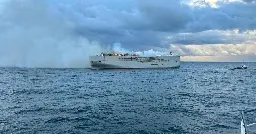
AMSTERDAM, July 26 (Reuters) - A fire blazed on Wednesday on a ship off the Dutch coast with nearly 3,000 vehicles, killing one person and injuring several others, the coastguard said.
The fire began on Tuesday night on the 199-metre Panama-registered Fremantle Highway, which was en route from Germany to Egypt, forcing several crew members to jump overboard.
Rescue ships sprayed water onto the burning boat to cool it down, but too much water risked its sinking, the Dutch coastguard said. A salvage vessel hooked on to stop it drifting.
"The fire is most definitely still not controlled. It's a very hard fire to extinguish, possibly because of the cargo the ship was transporting," said Edwin Versteeg, a spokesperson for the Dutch Department Of Waterways and Public Works.
The coastguard said on its website that the cause of the fire was unknown, but a coastguard spokesperson had earlier told Reuters it began near an electric car.
The coastguard said the Fremantle, which had departed from the port of Bremerhaven, had been towed out of shipping lanes and could sink. It was 27 km (17 miles) north of the Dutch island of Ameland when the fire started.
All 23 crew members were evacuated.
A helicopter took some suffering from smoke inhalation to medical facilities on the mainland.
Coastguard spokesperson Edwin Granneman said salvaging experts were trying to work out next steps for the burning boat.
A spokesperson for Shoei Kisen Kaisha, the Japanese ship leasing company that manages the Fremantle, was not immediately available for comment.
The incident was the latest of several fires in recent times on car carriers.
Earlier this month, two New Jersey firefighters were killed and five injured battling a blaze on a cargo ship carrying hundreds of vehicles.
A fire destroyed thousands of luxury cars on a ship off the coast of Portugal's Azores islands in February last year.
Land mines are in place around a Russian-occupied nuclear plant in Ukraine, UN watchdog warns
The U.N. atomic watchdog says its monitors at Ukraine’s Russian-occupied Zaporizhzhia Nuclear Power Plant report seeing anti-personnel mines around the site.
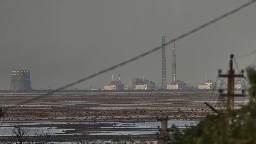
KYIV, Ukraine (AP) — The U.N. atomic watchdog says its monitors at the Russian-occupied Zaporizhzhia Nuclear Power Plant reported seeing anti-personnel mines around the site as Ukraine’s military pursues a counteroffensive against the Kremlin’s entrenched forces after 17 months of war.
The International Atomic Energy Agency said its team observed the mines Sunday in a restricted area that is off-limits to the plant’s Ukrainian staff. The agency did not directly attribute the placement of the mines to the Russians but said its experts were told “it is a military decision, and in an area controlled by military.”
“Having such explosives on the site is inconsistent with the IAEA safety standards and nuclear security guidance and creates additional psychological pressure on plant staff,” Rafael Mariano Grossi, the agency’s director general, said in a statement late Monday.
However, any detonation of the mines, which were facing away from the plant and located between its internal and external perimeter barriers, “should not affect the site’s nuclear safety and security systems,” the statement said.
The IAEA has repeatedly expressed concern that the war could cause a potential radiation leak from the facility, which is one of world’s 10 biggest nuclear power stations. The plant’s six reactors have been shut down for months, but it still needs power and qualified staff to operate crucial cooling systems and other safety features.
Ukraine’s military intelligence said last month without providing evidence that Russia is planning a “large-scale provocation” at the nuclear power plant in the southeast of the country and had placed suspected explosives on the roof. Russia, in turn, has alleged without offering evidence that Ukraine was planning a false flag attack involving radioactive materials.
The IAEA statement said that the Russian occupiers still haven’t granted it access to the roofs of the reactors and their turbine halls.
Meanwhile, Ukrainian authorities said Tuesday that air defenses intercepted Iranian-made Shahed drones that Russia fired at Kyiv overnight, in what was the sixth drone attack on the capital this month. No casualties or damage were reported, according to Serhii Popko, head of the Kyiv regional military administration head.
The Russian Defense Ministry said a Russian patrol ship destroyed two Ukrainian sea drones that attacked it in the Black Sea early Tuesday. It said the crew of the Sergey Kotov patrol ship of the Russian Black Sea Fleet wasn’t hurt in the attack 370 kilometers (200 nautical miles) southwest of the Crimean port of Sevastopol.
Ukrainian officials, in turn, said that Russians used cluster munitions in an attack on Kostiantynivka, in the eastern Donetsk region, late Monday.
Rockets hit a recreational pond, killing a 10-year-old boy and wounding four other children ranging in age from 5 to 12, according to Pavlo Kyrylenko, head of the Donetsk regional military administration.
Russia and Ukraine have both used cluster munitions throughout the war, and the U.S. has recently provided them to Ukraine.
Western analysts said Tuesday that Russia’s recent attacks on Odesa and other parts of southern Ukraine have employed missiles that were originally developed to destroy aircraft carriers.
Each missile weighs 5.5 metric tons, the U.K. Ministry of Defense said in an assessment.
In only a week, Russia has fired dozens of missiles and drones at the Odesa region, on Monday hitting a cathedral. The strikes have come since Moscow broke off from a landmark grain deal a week ago. Odesa is a key Ukrainian hub for exporting grain.
The attacks have damaged several grain silos at Chornomorsk Port, south of Odesa, and Russian drones have hit docks on the Danube River, approximately 200 meters (650 feet) from the Romanian border, according to the assessment.
What are cloudbursts and is climate change making them more frequent?
Intense rainfall in the Himalayan regions of India’s Kashmir state and adjacent mountainous cold desert of Ladakh earlier this week destroyed roads and caused flooding of dozens of villages.
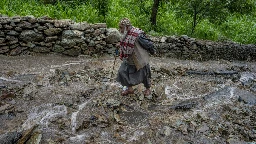
SRINAGAR, India (AP) — Last Saturday, Mohammed Aslam was working in his kitchen garden when he heard his fellow villagers shouting that water was coming from the nearby foothills in southern Kulgam area in Indian-controlled Kashmir. Within moments, the farmer said, mud and muck from gushing water swept through the village, damaging scores of homes.
“It was sudden and swift,” Aslam said.
A cloudburst followed by flashfloods hit nearly a dozen villages in Kulgam, filling homes with mud and washing away some cattle.
A day before, on Friday night, another cloudburst in the neighboring arid, cold desert region of Ladakh triggered flashfloods and inundated parts of its major town, Leh. The floodwaters entered the town’s main market, damaging shops, sweeping away vehicles and leaving its streets a muddy mess.
Intense rainfall in the Himalayan regions of India’s Kashmir state and the adjacent mountainous cold desert of Ladakh last week destroyed roads and caused flooding of dozens of villages.
Cloudbursts are a common occurrence in Himalayan regions but experts are alarmed by the increase in extreme weather-related events.
Intense weather events, especially when more than 10 centimeters (3.94 inches) of rainfall occurs within a 10 square kilometers (3.86 square miles) region within an hour, are called cloudbursts. They have the potential to wreak havoc, causing intense flooding and landslides that affect thousands of people in mountainous regions.
Last year, a cloudburst triggered flash floods during an annual Hindu pilgrimage to a Himalayan Mountain cave in southern Kashmir, l eaving at least 16 people dead.
In 2010, dozens of villages and the main town of Leh in Ladakh were hit by the worst floods in its recent history. Homes and farm fields were devastated and over 250 people were killed.
Experts say the frequency of such events has been increasing in recent years partly due to climate change. They say damage caused by cloudbursts is also increasing because of unplanned development in mountain regions.
Cloudbursts are like a “a huge bucket filled with water that is toppled over,” said Anand Sharma, a retired meteorologist with the Indian Meteorological Department, the country’s weather agency. Born in the Himalayan region, Sharma has closely observed this phenomenon over his three-decade career.
Sharma says cloudbursts occur when cumulonimbus clouds — enormous water-filled, cauliflower-shaped clouds — empty their contents because of cold air pushing the water down. “Normally there are drafts flowing both up and down but in certain conditions, especially when the cloud grows up vertically, sometimes up to 16 kilometers (9.94 miles), cold air enters the cloud and the air flow moves only downwards,” he said.
Mukhtar Ahmed, an official at IMD’s Kashmir office. said global warming is increasing the frequency of cloudbursts. “We are witnessing flash floods, cloudbursts and unusually high temperatures more often now,” he said.
Sharma said “Global warming is leading to more evaporation of water and because of this dense cumulonimbus clouds are forming, resulting in intense rainfall.” While some regions receive intense rainfall, he said global warming is resulting in prolonged droughts in other regions.
Experts say excessive deforestation and unplanned developments should be avoided in climate-vulnerable regions such as the Himalayas.
“The chances of landslides increase when there is excessive deforestation. Similarly, when there are known flood paths, it is best to avoid any construction in those regions,” said Mahesh Palawat a meteorologist with Skymet Weather, a private weather forecaster in India.
“It is important for people living on foothills or slopes to be moved to higher ground when heavy rains are likely to occur to minimize loss of life,” Palawat added.
Saudi Arabia is spending billions to become a global gaming hub. Some fans don't want to play
Saudi Arabia aims to become the “ultimate global hub” of the $180 billion-a-year video game industry.

DUBAI, United Arab Emirates (AP) — Saudi Arabia, the new home of some of soccer’s biggest stars and a co-owner of professional golf, is proving to be no less ambitious when it comes to another global pastime – the $180 billion-a-year video game industry.
Last September, the Saudi sovereign wealth fund earmarked nearly $40 billion for a new conglomerate aimed at transforming the kingdom into the “ultimate global hub” for games and esports by 2030. In February, the Saudi fund became the biggest outside investor in Nintendo, and just this month the kingdom hosted a major gaming tournament with a record $45 million prize pool.
That’s made Saudi Arabia an increasingly important player in the industry and contributed to its breakneck transformation from an insular kingdom best known for oil and ultraconservative Islam into an emerging sports and entertainment powerhouse.
The move into gaming has sparked the same kind of backlash seen in soccer and golf, where critics accuse the Saudis of “sportswashing” human rights abuses, including the 2018 killing of Washington Post columnist Jamal Khashoggi, a Saudi dissident.
With gaming, a kingdom that sentences people to decades in prison over a few tweets is joining a worldwide community dominated by the young and very online.
“It’s the Romans and the Colosseum all over again, and you have countries at the top layer using sports as a theater to display their wealth and their power,” said Joost van Dreunen, a professor at New York University who has written a book about the business of video games.
“You have to ask the question: Who is the architect behind this, and what are the intentions of these architects?” he said.
Saudi Arabia’s 37-year-old Crown Prince Mohammed bin Salman, reportedly an avid gamer himself, sees the foray into gaming as part of Vision 2030, his ambitious plan to overhaul the kingdom’s economy, reduce its reliance on oil and provide jobs and entertainment for its youthful population.
“We are harnessing the untapped potential across the esports and games sector to diversify our economy,” he said last September, when he announced the establishment of the Savvy Games Group.
Owned by Saudi Arabia’s $700 billion Public Investment Fund and led by CEO Brian Ward, an industry veteran, Savvy aims to invest $39 billion in the gaming industry. It hopes to establish 250 local companies and create 39,000 jobs in the next seven years.
Earlier this month, it completed the $4.9 billion purchase of Scopely, the creator of “Monopoly Go,” “Star Trek Fleet Command” and “Marvel Strike Force.”
Gaming is a massive and fast-growing industry. Market research firm Newzoo says an estimated 3.2 billion people play games on PCs, consoles, mobile devices or cloud gaming services, with the industry generating $184.4 billion in revenues in 2022. Gaming brings in more money than the combined earnings of the global box office, music streaming and album sales, and the top five wealthiest sports leagues, according to a 2021 report by the Boston Consulting Group.
The kingdom is also breaking into the world of esports, competitions pitting the world’s top players against one another in games ranging from battle royales and first-person shooters to “FIFA” soccer and “Madden NFL.”
To the uninitiated, the prospect of watching other people play video games may seem unappealing, but it’s a huge business with millions of fans, celebrity players and corporate sponsors. A 2021 esports tournament in Singapore drew 5.4 million concurrent viewers.
“When you invest in esports you are getting prime advertising opportunities, and of course, you are promoting the brand of your country as a cool, forward-thinking, interesting place to go on holiday,” said Christopher Davidson, a Gulf expert at the European Center for International Affairs, a Brussels-based think tank.
“(Esports) is far younger and more global than any other sport,” he added. “English soccer is popular everywhere in the West, but not really in an average-sized Chinese city. But these esports are.”
Last summer, Saudi Arabia hosted Gamers8, a weekslong tournament with a $15 million prize pool. The event returned this month with a prize pool three times as large.
Saudi Arabia’s wealthy Gulf neighbors are also looking to get in on the action. Dubai, in the United Arab Emirates, hosted a five-day esports festival last month. The Qatar Investment Authority recently purchased a minority stake in Monument Sports & Entertainment, which owns the Washington Wizards and Capitals, as well as esport holdings.
The growing involvement of autocratic Gulf states has sparked debate within the gaming community.
Riot Games, the developer of the popular “League of Legends,” a multiplayer battle game, and Danish tournament organizer Blast Premier both canceled partnerships with Saudi Arabia in 2020 following an outcry from fans. Blast went on to hold its world finals in Abu Dhabi, the capital of the UAE, where it faced similar criticism.
Team Liquid, an esports organization that represents 60 champion players across 14 games, announced in December that it would donate half its winnings from recent competitions in Saudi Arabia and the UAE to an organization that helps LGBTQ+ individuals escape violence and persecution.
Homosexuality is considered taboo in most of the Middle East and is criminalized in Saudi Arabia and the UAE, though prosecutions are rare. Both countries also outlaw any form of LGBTQ+ advocacy.
The Team Liquid statement acknowledged the financial and ethical trade-offs of accepting sponsorship from such countries.
“These events present real opportunities for our players, many of whom may have short careers with few guarantees,” it said. “An outright boycott might not only end careers, it could end our involvement in some esports entirely.”
Stanis Elsborg, a senior analyst at Play the Game, an international initiative that aims to promote ethics in sports, and who has written extensively on the intersection of esports and the Gulf’s ambitions, says it’s a dilemma that is likely to recur.
“Money talks,” he said. “I think the esports scene will be following the same trajectory as we have seen in other sports, forming significant partnerships with state-owned companies from autocratic states.”
Travis King: How the US negotiates with North Korea
A US soldier who crossed into North Korea is the subject of frantic diplomacy to secure his return.

The fate of Travis King, a US soldier who crossed into North Korea, remains unknown and experts say the US is at a critical stage to try and negotiate his return home.
The challenge is America has never had an official diplomatic relationship with North Korea.
As a result, the US relies on a network of backchannels to negotiate the return of citizens detained in the country.
It is believed the 23-year-old soldier is being detained and questioned by North Korean authorities.
Private 2nd Class King was last seen a week ago running across the demilitarised zone separating North and South Korea. Tensions have since escalated in the region, with North Korea firing two ballistic missiles into the sea late Monday after a US nuclear-powered submarine was stationed in the South.
"All sides are trying to understand what happened and what to do," said Mickey Bergman, executive director of the Richardson Center for Global Diplomacy.
Mr Bergman, who has spent nearly 20 years negotiating to return US citizens from hostile nations, said the best chance at releasing a prisoner is right after they are detained. This is when they are likely being interrogated by the country's officials but before they have been charged with a crime, like spying.
It's in that time before things become official that negotiators can best appeal to people's humanity, Mr Bergman said.
"I think there's a misconception about what negotiations are," he said.
"If we pound our chests, and flip tables, and demand that the evil North Koreans return our soldier, we are likely going to cause them to dig in."
Here's how the US has previously negotiated for American citizen's return.
Because the United States has never officially held diplomatic ties with North Korea, during a detainee crisis, Sweden has served as an intermediary from their embassy in Pyongyang and has helped to relay communications to North Korean officials.
But there are also backchannels. North Korea maintains a mission at the United Nations in New York. In times of crisis, the mission - dubbed the New York Channel - has become an avenue for officials for both countries to hold talks.
For years, Robert King was one of the first people who received a call when an American was captured by North Korea. As the former special envoy for North Korean Human Rights at the US State Department, the ambassador has helped negotiate for the release of multiple detainees including student Otto Warmbier and American missionary Kenneth Bae.
After 17 months in captivity, US college student Otto Warmbier was released from North Korean detention in 2017 in a comatose state. He returned to the United States with extensive brain damage and died days after reuniting with his family.
Otto Warmbier's death sparked international outrage and his family has levelled allegations of abuse and torture against the North Koreans.
After a brief period of diplomacy under the Trump administration, Mr King said renewed political tensions between the two countries often colour negotiations, making detainees a pawn in wider geopolitical fights.
"[The North Koreans] see this as, 'how do we use this opportunity to make the US look bad?' And whatever happens it's not going to be a happy outcome," Mr King said.
For nearly 20 years, Mr Bergman has worked alongside former New Mexico Governor Bill Richardson to secure the release of prisoners from countries hostile to the United States.
Although the Richardson Center is not involved in the Travis King case, Mr Bergman said in his experience, when it comes to North Korea, there isn't a playbook for negotiations.
Instead, he said, it is best to approach tense negotiations through what he calls "fringe diplomacy".
US non-profits and humanitarian agencies have provided aid to North Koreans for decades. When official channels stall, these non-governmental backchannels are often called upon to negotiate on behalf of a detainee's family.
An NGO's separation from the US government is a benefit, Mr Bergman said, because it allows negotiations to focus solely on the wellbeing and return of the detainee, instead of global politics.
"People can talk to us about policy issues but there's nothing we can do about that," he said. "We are much more able to insulate the issue and come up with pathways to resolve some of these situations."
Mr Bergman said the world often focuses on the moment of "intervention," when a political prisoner is rescued and returned home. But that moment, he said, is not possible without years of meaningful engagement.
"You have to build relationships so that when there is a crisis, you're not starting from scratch."
But the Covid pandemic has made both of these avenues of negotiation more challenging.
North Korea completely closed its borders during the pandemic and Mr Bergman said it is unclear if the Swedish Embassy in Pyongyang has returned to full capacity.
Complicating matters further, after a brief period of attempted diplomacy, the Trump administration imposed a travel ban to North Korea, rendering US passports and visas invalid.
The ban has remained in place under the Biden administration and has effectively ended humanitarian avenues for engagement, Mr Bergman said.
"North Korea is the only country in the world where there's a travel ban, that it's illegal for Americans to travel," he said. "The North Koreans see that as an insult."
Mr Bergman, who was involved in the negotiations for Warmbier's release, said he believes the international blowback over Otto Warmbier's death has shifted the North Korean perspective on political detainees, and the country may be more amenable to compromise.
"After dealing with the Otto Warmbier negotiations, and the very tragic outcome, I believe that the North Koreans have chosen not play in the game of political prisoners anymore," he said.
But whether that means US army private Travis King will have a speedy release, remains to be seen, he said.
Ukraine war: UK criticised for 'lack of understanding' of Wagner's activities in Africa
A new report says that for 10 years the British government under-estimated the Russian mercenary group.
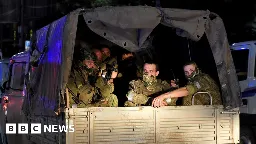
The UK government has been sharply criticised by the Parliamentary Foreign Affairs Committee (FAC) for under-estimating the dangerous growth of Russia's Wagner mercenary group.
In a scathing report, the cross-party committee of MPs accused the government of what it called "a dismal lack of understanding" of Wagner's activities in Africa.
"We are deeply concerned by the government's dismal lack of understanding of Wagner's hold beyond Europe, in particular their grip on African states," says the Committee's chair, Alicia Kearns MP.
Meaning what, exactly?
The report itemises seven states where Wagner's military activity has been detected: Ukraine, Syria, the Central African Republic (CAR), Sudan, Libya, Mozambique and Mali.
Wagner has developed a highly successful and profitable business model in these countries, enriching itself and its client rulers, mostly at the expense of the local population.
The committee, which for the first time has commissioned open-source investigative research for its 82-page report, asserts that for 10 years the British government has "under-played and under-estimated the Wagner Network's activities, as well as the security implications for Europe".
This topic has become all the more relevant this week as somewhere between 3000-10,000 Wagner mercenary fighters have set up base in Belarus while rhetorically announcing their desire to make a cross-border raid into Poland, a Nato state.
The FAC report has used evidence provided by a well-placed and senior Wagner source, a "defector", who revealed that his organisation had boasted of teaching local police authorities in the CAR how to torture civilian captives.
The Wagner Group is accused of murdering hundreds of civilians in that country while helping to prop up the regime that pays their salaries.
Mali is a prime example of a country where the Wagner Group has successfully supplanted Western, French-led forces, while ingratiating itself with an autocratic government that recently seized power.
"Where the West moves out, Wagner moves in, seeing opportunity in suffering and profit in chaos," says the report.
"The UK must provide an alternative for countries that are struggling', it adds. "It is a foreign policy goal of the Kremlin to force failing states to rely on the Wagner network."
Beyond Africa, the Wagner group was instrumental in enabling Russia's illegal occupation and annexation of Crimea in 2014.
They have since been one of Russia's most effective fighting forces in Ukraine and have recently set up base in Belarus. Today's report calls the government's approach to Wagner "remarkably complacent".
Ms Kearns told the BBC that the Wagner group was symptomatic of the wider need to regulate Private Military Companies (PMCs).
While she maintained that the atrocities allegedly committed by the Wagner Group, notably in the CAR, were in a class of their own, she acknowledged that criticism could also be levelled at Western-backed PMC's such as the US security company Blackwater that was accused of killing civilians during its time as a contractor in Iraq.
There is also a post-colonial history of western mercenary soldiers operating in Africa in the past with scant regard for human rights, notably in the Congo.
But just how much could the UK do or have done, given that the Wagner group is effectively an arm of the Russian government?
"Sanctions are not enough," says Ms Kearns. "The UK needs to proscribe the Wagner group for what it is: a terrorist organisation."
Ukraine live briefing: Russia hopes to boost ties with North Korea; Moscow to raise maximum draft age
Russia’s lower house has passed legislation that will raise the country’s maximum draft age from 27 to 30 as Moscow scrambles to find fighters for its war in Ukraine. The changes will be enacted on Jan. 1, according to an official Telegram channel. Current Russian law requires men between 18 and 27 to complete one year of military service.
UN starts removing oil from decaying tanker near Yemen in Red Sea
The United Nations said on Tuesday it had started the removal of more than 1 million barrels of oil from a decaying supertanker off Yemen's Red Sea coast in a complex operation it hopes will ward off a regional disaster.
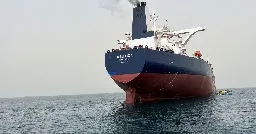
DUBAI/GENEVA, July 25 (Reuters) - The United Nations said on Tuesday it had started the removal of more than 1 million barrels of oil from a decaying supertanker off Yemen's Red Sea coast in a complex operation it hopes will ward off a regional disaster.
U.N. officials have been warning for years that the Red Sea and Yemen's coastline was at risk as the Safer tanker could spill four times as much oil as the 1989 Exxon Valdez disaster off Alaska.
A U.N. spokesperson said on Tuesday a spill could cost $20 billion to clean up.
The war in Yemen caused the suspension in 2015 of maintenance operations on the Safer, which is used for storage and has been moored off Yemen for more than 30 years.
The U.N., which has never before undertaken such a rescue mission, has warned its structural integrity has significantly deteriorated and it is at risk of exploding.
"In the absence of anyone else willing or able to perform this task, the United Nations stepped up and assumed the risk to conduct this very delicate operation," U.N. Secretary-General Antonio Guterres said.
"The ship-to-ship transfer of oil which has started today is the critical next step in avoiding an environmental and humanitarian catastrophe on a colossal scale."
The oil transfer is expected to take 19 days to complete, the United Nations' Development Programme (UNDP) said in a statement.
"We are obviously very cautious – it's only the beginning of a transfer," UNDP spokesperson Sarah Bel told a Geneva press briefing when asked about the operation's risks.
"The cost of an oil spill is estimated to be approximately $20 billion, and it will take years to clean up," she added.
She warned that any spilled oil could reach the African coast, damaging fish stocks for the next 25 years and destroying 200,000 jobs.
It would also close ports that bring food and supplies to Yemen, where some 17 million people rely on humanitarian aid, she said.
Reporting by Nadine Awadalla and Nayera Abdallah in Dubai and Emma Farge in Geneva; Writing by Clauda Tanios; Editing by Louise Heavens and Jan Harvey
Wildfires bring death and destruction to Mediterranean
Wildfires killed 34 people in Algeria and forced the evacuation of thousands of tourists from the Greek island of Rhodes as an intense summer heatwave scorched large areas of the Mediterranean.
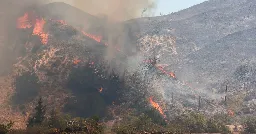
RHODES/ALGIERS, July 25 (Reuters) - Wildfires killed 34 people in Algeria and forced the evacuation of thousands of tourists from the Greek island of Rhodes as an intense summer heatwave scorched large areas of the Mediterranean.
Another blaze caused the temporary closure of Palermo airport on the southern Italian island of Sicily on Tuesday, while an overnight storm tore off roofs and brought down trees in the north of the country, killing two people.
Extreme weather throughout July has caused havoc across the planet, with temperatures breaking records in China, the United States and southern Europe, sparking forest fires, water shortages and a rise in heat-related hospital admissions.
Without human-induced climate change, the events this month would have been "extremely rare", according to a study by World Weather Attribution, a global team of scientists that examines the role played by climate change in extreme weather.
The heat, with temperatures topping 40 Celsius (104 Fahrenheit), is well in excess of what usually attracts tourists who flock to southern European beaches.
In some parts of eastern Sicily, temperatures rose to 47.6 Celsius on Monday, close to a record European high of 48.8 Celsius recorded on the island two years ago.
It was even hotter in North Africa, with temperatures of 49 Celsius recorded in some cities in Tunisia.
Neighbouring Algeria deployed some 8,000 firefighters to bring its deadly fires under control, authorities said.
MASS EVACUATION
The fires burning on the island of Rhodes for the past week have forced the Greek authorities to carry out the largest evacuation ever undertaken in the country, with more than 20,000 people forced to leave homes and hotels.
"I will state the obvious: in the face of what the entire planet is facing, especially the Mediterranean which is a climate change hot-spot, there is no magical defence mechanism, if there was we would have implemented it," Greek Prime Minister Kyriakos Mitsotakis said on Tuesday.
The fires will deal a blow to a tourism industry that is a mainstay of the Greek economy. It accounts for 18% of Greece's GDP and one in five jobs, with reliance on tourism even greater on islands such as Rhodes.
"It's very, very bad, the situation. We need help. Send us help from everywhere," said Lanai Karpataki, a local resident in Kiotari on the south of Rhodes.
Malta, another major Mediterranean holiday destination, suffered a raft of power cuts across the country, affecting its largest hospital, after a week-long heatwave.
'SILENT KILLER'
Scientists have described extreme heat as a "silent killer" taking a heavy toll on the poor, the elderly and those with existing medical conditions.
Research published this month said as many as 61,000 people may have died in Europe's sweltering heatwaves last summer, suggesting countries' heat preparedness efforts are falling fatally short.
The heat has caused large-scale crop damage and livestock losses, the World Weather Attribution scientists said, with U.S. corn and soybean crops, Mexican cattle, southern European olives as well as Chinese cotton all severely affected.
Responding to the damage caused by the storm in Milan, the mayor of Italy's financial capital said the cause was clear.
"I have been through 65 summers in my lifetime... and what I am seeing now is not normal, we can no longer deny it, climate change is changing our lives," Mayor Giuseppe Sala said on social media.
Reporting by Angeliki Koutantou, Renee Maltezou, Federico Maccioni, Alvise Armellini, Lamine Chikhi, Jana Choukeir, and Nayera Abdalla and David Stanway Writing by Keith Weir; Editing by Janet Lawrence